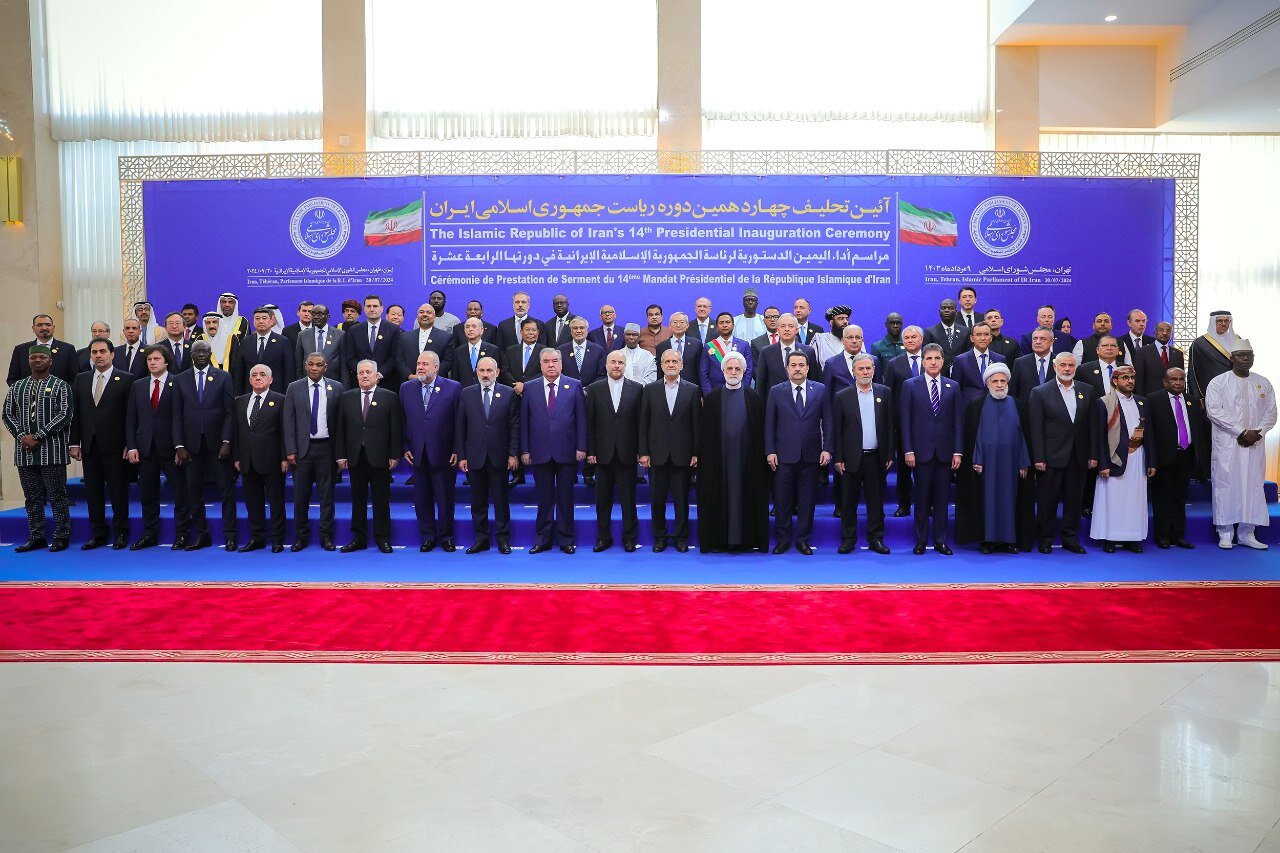Yes to Engagement No to Pressure

TEHRAN– Masoud Pezeshkian took the oath of office before Iranian lawmakers, the Judiciary chief, members of the Constitutional Council, the head of the Assembly of Experts, senior military officials, current and ex-ministers, as well as more than 70 foreign delegates on Tuesday.
Compared to the president's endorsement ceremony attended by the Leader of the Islamic Revolution, a significantly higher number of journalists were allowed to cover the event closely. We were directed to a specific area in the parliament, which was somewhat separated from the main action, making it easy to overlook what was happening in all parts of the podium.
The ceremony opened at 4:20 PM local time with the recitation of three verses from Surah An-Nahl, verses that emphasize the importance of guidance and the elements necessary for a strong and prosperous society.
The first official to deliver a speech was Parliament Speaker Mohammad Baqer Qalibaf, who said lawmakers will utilize all tools to help the new Iranian administration. “Iran's parliament will employ all its legislative, supervisory, and advisory capacities to bolster the 14th government in its challenging path to serve the esteemed nation of Iran,” he stated.
He also highlighted Iran's ability to hold snap presidential elections just 40 days after the unexpected passing of President Ebrahim Raisi, noting that the electoral process was conducted smoothly, fairly, and without any disruptions. "The tragic death of late President Ebrahim Raisi and his companions presented a renewed test for the Islamic Republic of Iran in the eyes of global analysts. The wise leadership of the Leader of the Islamic Revolution, however, turned this into a symbol of stability in Islamic Iran.”
The second official to deliver a speech was Iran’s Judiciary Chief Gholam Hossein Mohseni Eje'I, whom Pezeshkian was sworn by.
As part of his oath, the president swore to use all his talents and qualities to fulfill his presidential duties, pledging to preserve Islam, the Islamic Republic system, and the Constitution. He then began delivering a speech to the audience in the parliament.
In his inaugural address, Pezeshkian laid out a vision for Iran's future, emphasizing constructive engagement with the world while upholding national dignity and interests. He declared, "The world needs to seize this unparalleled opportunity to address regional and international issues through the collaboration of a powerful, peace-seeking, and dignified Iran."
Pezeshkian articulated his foreign policy approach as one rooted in "dignity, wisdom, and expediency," promising to prioritize constructive engagement with the international community. "In our vision," he stated, "Iran engages constructively and effectively in international relations while emphasizing religious democracy, social justice, legitimate freedoms, the preservation of human dignity and rights, and social and judicial security."
Addressing the issue of Western sanctions, Pezeshkian asserted, "I consider the normalization of Iran's economic and trade relations with the world to be Iran's legitimate right, and I will not rest until the unjust sanctions are terminated." He made clear his government's stance against bullying and pressure, stating, "The experience of over two decades of negotiations with Iran should have made [Western] governments understand that we have been and will remain committed to our obligations. Iran does not respond to pressure and excessive demands."
Pezeshkian highlighted the importance of regional cooperation, calling for an end to tensions and rivalries among neighboring countries. "Neighboring countries should not waste their valuable resources in tensions and protracted rivalries," he stated. "My government seeks a strong region where all neighboring countries can take joint steps towards economic development, progress, and the improvement of future generations' lives through synergy."
He emphasized the need for regional unity to counter extremist influences, stating, "Radical voices should not drown out the voices of the nearly two billion peace-loving Muslims. Islam is a religion of peace."
The president’s remarks on Israel’s war in Gaza received several rounds of applause from the attendees. He expressed hope for a world where Palestinian children are liberated from Zionists’ oppression, asserting, "No Palestinian child's dreams should be buried under the rubble of their homes.” Pezeshkian also slammed Western countries for continuing to arm Israel, while posing as defenders of human rights.
Pezeshkian is now required by law to submit the final list of his cabinet to parliament for approval within two weeks.
By Mona Hojat Ansari
